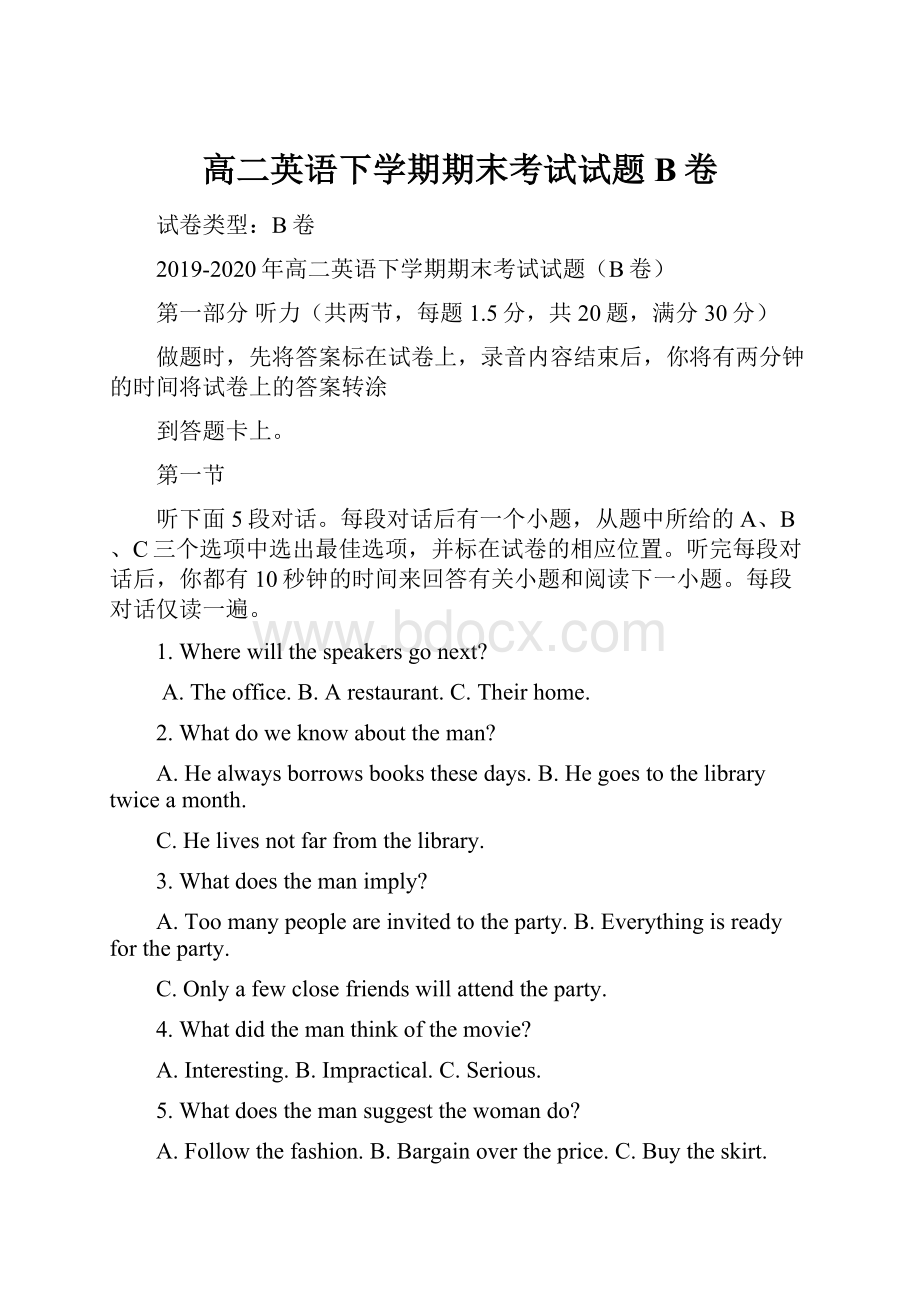高二英语下学期期末考试试题B卷.docx
《高二英语下学期期末考试试题B卷.docx》由会员分享,可在线阅读,更多相关《高二英语下学期期末考试试题B卷.docx(19页珍藏版)》请在冰豆网上搜索。

高二英语下学期期末考试试题B卷
试卷类型:
B卷
2019-2020年高二英语下学期期末考试试题(B卷)
第一部分听力(共两节,每题1.5分,共20题,满分30分)
做题时,先将答案标在试卷上,录音内容结束后,你将有两分钟的时间将试卷上的答案转涂
到答题卡上。
第一节
听下面5段对话。
每段对话后有一个小题,从题中所给的A、B、C三个选项中选出最佳选项,并标在试卷的相应位置。
听完每段对话后,你都有10秒钟的时间来回答有关小题和阅读下一小题。
每段对话仅读一遍。
1.Wherewillthespeakersgonext?
A.Theoffice.B.Arestaurant.C.Theirhome.
2.Whatdoweknowabouttheman?
A.Healwaysborrowsbooksthesedays.B.Hegoestothelibrarytwiceamonth.
C.Helivesnotfarfromthelibrary.
3.Whatdoesthemanimply?
A.Toomanypeopleareinvitedtotheparty.B.Everythingisreadyfortheparty.
C.Onlyafewclosefriendswillattendtheparty.
4.Whatdidthemanthinkofthemovie?
A.Interesting.B.Impractical.C.Serious.
5.Whatdoesthemansuggestthewomando?
A.Followthefashion.B.Bargainovertheprice.C.Buytheskirt.
第二节
听下面5段对话或独白。
每段对话或独白后有几个小题,从题中所给的A、B、C三个选项中选出最佳选项,并标在试卷的相应位置。
听每段对话或独白前,你将有时间阅读各个小题,每小题5秒钟;听完后,各小题将给出5秒钟的作答时间。
每段对话或独白读两遍。
听下面一段对话,回答第6和第7两个小题。
6.Whatisthewomandoingnow?
A.Makingintroductionstotheman.B.Havinganinterviewwiththeman.
C.Showingthemanaroundthepany.
7.Whenwillthemanhavemeetings?
A.EveryMonday.B.EveryThursday.C.EveryFriday.
听下面一段对话,回答第8和第9两个小题。
8.HowdoesJanefeel?
A.Excited.B.Exhausted.C.Anxious.
9.WhatdoesJanedo?
A.Aprofessor.B.Adoctor.C.Astudent.
听下面一段对话,回答第10至第12三个小题。
10.WhywillthewomangotoBrazil?
A.TowatchtheRoboCup.B.Totakepartinapetition.
C.Tospendavacationwithherfamily.
11.WhatisMarkcrazyabout?
A.Robots.B.Football.C.Traveling.
12.HowmanytimeshasMark´steamtakenpartintheRoboCupbefore?
A.Twice.B.Fourtimes.C.Threetimes.
听下面一段对话,回答第13至第16四个小题。
13.Whatdothespeakersusuallydoatthemall?
A.Enjoyallkindsofdeliciousfood.B.Spendalotofmoneyonboots.
C.Lookatthingswithoutbuyingthem.
14.Howdidthewomanknowabouttheoutdoormarket?
A.Fromafriend.B.FromtheInternet.C.FromTV.
15.Whatdoesthewomansayabouttheoutdoormarket?
A.Itisn´tbigenough.B.Thefoodthereischeap.
C.Thereareeighthalls.
16.Howwillthespeakersgototheoutdoormarket?
A.Bysubway.B.Bycar.C.Onfoot.
听下面一段独白,回答第17至第20四个小题。
17.Whencanthestudentsvisitthelanguagelaboratory?
A.OnMonday.B.OnTuesday.C.OnWednesday.
18.WhatlessonsdothestudentshaveonThursdaymorning?
A.Listeningandspeaking.B.Pronunciationandvocabulary.
C.Writingandputing.
19.WhatwillthestudentsdofirstonFriday?
A.Reviewlessonsfortheweek.B.Haveaputerlesson.C.Practicewriting.
20.Whatdoesthespeakerremindthestudentstodointheend?
A.Finishthehomeworkontime.B.Doself-studyinginthelibrary.
C.Turntotheteachersforanyproblems.
第二部分阅读理解(共两节,满分40分)
第一节(共15题:
每小题2分,满分30分)
阅读下列短文,从每题所给的四个选项(A、B、C和D)中,选出最佳选项,并在答题卡上将该项涂黑。
A
Today,inmanyplaces,likerestaurantsandhotels,peopleuseWechatorotherkindsofpaymenttopayfortheirbills.Sosomescholarssaythatthewalletisheadingforextinction.Itwilldieoffwiththegenerationwhoreadprintednewspaper.Thekindofshoppingwhereyouhandovernotesandcountoutchangeinreturnnowhappensonlyinsmallretail(零售)counters,likebuyingabarofchocolateorapintofmilkfromacornershop.Attheshopswhereyouspendanyrealmoney,thatmoneyisincreasinglyabstract.AtthemostfamousretailstoreVictoriaBeckhamonDoverStreet,youdon’thavetostandatanykindofcashregisterwhenyoudecidetopay.ThestaffareequippedwithiPadstotakeyourpaymentwhileyourelaxonasofa.Whereveryougo,youcangetanexcellentservice,ifyouhavethemoney.Butacrosssociety,theabstractionoftheideaofcashmakesmeuneasy.MaybeI’mjustold-fashioned.Butearningmoneyisn’tquickoreasyformostofus.Isn’titabitweird(怪异的)thatspendingitshouldhappeninhalfablinkofaneye?
ButI’llleavetheeconomicstotheexperts.Whatbothersmeaboutthedeathofthewalletisthechangeitreflectsinourphysicalenvironment.TheoppositeofawalletisasmartphoneoraniPad.Whenwepayforanything,insteadofdiggingthroughpiecesofpaperandpeeringintocornersinawallet,whatweneedtodoistomoveourfingersleftandright.Showyourwallet,ifyoustillhaveone.Itmaynotbeheremuchlonger.
21.Accordingtothetext,customerscanpaytheirbills_________inbigmodernstores.
A.secretlyB.separatelyC.electronicallyD.mentally
22.Whatmakesthewriterfeelunfortablenowadays?
A.Savingmoneyisoutofdate.B.Spendingmoneyissofastandeasy.
C.Earningmoneyisgettingmoredifficult.D.Thepleasureofspendingmoneyisfading.
23.Thewriterimpliesthat_________.
A.helikesthenatureofhiswalletB.heisagainsttechnologicalprogress
C.hefeelsinsecureaboutthechangesofthemodernpayment
D.hewantstoreturntotheoldtraditionsoftheoldsociety.
B
Inthelate1950s,aRussiangeneticistcalledDmitryK.Belyaevattemptedtocreateatame(驯化的)foxpopulation.ThroughtheworkofabreedingprogrammeattheInstituteofCytologyandGeneticsatNovosibirsk,inRussia,hesoughttofindtheevolutionarypathwayoftameanimals.Histestsubjectsweresilver-blackfoxes,amelanistic(带黑色的)versionoftheredfoxthathadbeenbredinfarmsforthecoloroftheirfur.
Heselectedtheanimalsbasedonhowtheyrespondedwhentheircagewasopened.About10%ofthefoxesdisplayedaweak“wild-response”,meaningtheyweredocilearoundhumans.Thosethathidintheerormadeaggressivevoiceswereleftinthefarm.Ofthosefriendlyfoxes,100femalesand30maleswerechosenasthefirstgenerationsofparents.
Whentheyoungfoxeswereborn,theresearchershand-fedthem.Theyalsoattemptedtotouchorpetthefoxeswhentheyweretwototwo-and-a-halfmonthsold,forstrictlymeasuredperiodsatatime.Iftheyoungfoxescontinuedtoshowaggressiveresponse,evenaftersignificanthumancontact,theywerethrownawayfromthepopulation---meaningtheyweremadeintofurcoats.Ineachselection,lessthan10%oftameindividualswereusedasparentsofthenextgeneration.
Bythefourthgeneration,thescientistsstartedtoseedramaticchanges.Theyoungfoxeswerebeginningtobehavemorelikedogs.Theywaggedtheirtailsand“eagerly”soughtcontactwithhumans.By2005-2006,almostallthefoxeswereplayful,friendlyandbehavinglikedomesticdogs.Thefoxescould“read”humanhintsandrespondcorrectlytogesturesorglances.
24.WhatdoweknowaboutBelyaev’sbreedingplan?
A.Itexplainshowredfoxeswerebred.
B.Itfocusesonhowtameanimalsevolved.
C.Itexplainswhypetfoxesbecamepopular.
D.Itconcentratesonwhytameanimalsdisappeared.
25.Howdidhechoosehistestfoxesintheexperiment?
A.Byappearance.B.Bycolor.
C.Byreaction.D.Byflexibility.
26.WhatcanbeinferredfromParagraph3?
A.Smartfoxeswereusedfortesting.
B.Thepurposeofselectionwasunclear.
C.Friendlyfoxeswerekeptontesting.
D.Theselectionwasnotexactandthorough.
27.Whatisthedistinguishingcharacteristicofthefourthgenerationfoxes?
A.Behavinginafriendlierway.B.Eatingplants.
C.Havingdroopingears.D.Havingshortenedlegs.
C
Despitegainsinrecentyears,womenstillfallbehindmeninsomeareasofmathachievement,andthequestionofwhyhascausedheatedargument.Now,astudyoffirstandsecondgraderssuggestswhatmaybepartoftheanswer:
Femaleprimaryschoolteacherswhoareconcernedabouttheirownskillscouldbepassingthatalongtothelittlegirlstheyteach.
Youngstudentstendtomodelthemselvesafteradultsofthesamesex,explainedBeilock,anassociateprofessorinpsychologyattheUniversityofChicago.Littlegirlsmaylearntofearmathfromthewomenwhoaretheirearliestteachers.Beilockandhercolleaguesstudied52boysand65girlsinclassestaughtby17differentteachers.NinetypercentoftheUSprimaryschoolteachersarewomen,aswasallofthoseinthisstudy.
Students’mathabilitywasnotrelatedtoteachers’mathanxietyatthestartoftheschoolyear,butattheendoftheyear,themoreanxiousteacherswereabouttheirownskills,themorelikelytheirfemalestudents—butnottheboys—weretoagreetothat“boysaregoodatmathandgirlsaregoodatreading”.Inaddition,thegirlswhoansweredthatwayscoredloweronmathteststhaneithertheclasses’boysorthegirlswhohadnotdevelopedsuchabelief,theresearchersfound.
Afterseeingtheresults,theresearchersremendedthatthemathrequirementsforobtainingaprimaryeducationteachingdegreeshouldberethought.“Ifthenextgenerationofteachers,especiallyprimaryschoolteachers,isgoingtoteachtheirstudentsmoreeffectively,morecareneedstobetakentodevelopbothstrongmathskillsandpositivemathattitudesintheseeducators,”theresearcherswrote.
“Girlswhogrowupbelievingfemaleslackmathskillswindupavoidinghardermathclasses.Itkeepsgirlsandwomenoutofalotofcareers,particularlyinsciencetechnology,”Beilocksaid.
28.Wecanlearnfromthefirstthreeparagraphsthat______.
A.teachersinUSprimaryschoolsaremostlyfemales
B.thestudentsinvolvedinthestudyarestartersatprimaryschool
C.youngstudentsusuallyfollowexampleoftheirfemaleteachers
D.it’struethatboysdowellinmathwhilegirlsdowellinreading
29.Wecanweinferfromthetext?
A.Beilock’sstudywillbringaboutaprimaryeducationrevolution.
B.Girls’lackofconfidenceinmathskillsaffectstheirfuturejobs.
C.Theperformanceofthestudentschangedlittleduringtheprocessofthestudy.
D.Theresearchersarguedthatcurrentprimaryschooleducationneededimproving.
30.What’sthesu